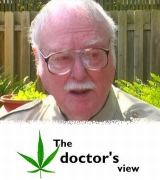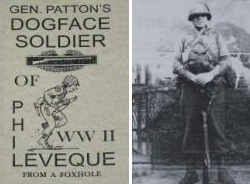
Publisher:
Bonnie King
CONTACT:
Newsroom@Salem-news.com
Advertising:
Adsales@Salem-news.com

~Truth~
~Justice~
~Peace~
TJP
Apr-10-2010 13:51

 TweetFollow @OregonNews
TweetFollow @OregonNews
New York Times on Stress, Depression and Therapy: a Gentle Education
Dr. Phil Leveque Salem-News.comIn addition to being a retired Osteopathic doctor, Phil Leveque is a Professor of Pharmacology and a Forensic Toxicologist.
 Courtesy: thistimethisspace.com |
(MOLALLA, Ore.) - I have accidentally become an expert on (military) stress (PTSD), depression and therapy. The Veterans Administration considers PTSD to be almost synonymous with Clinical Depression and tries to treat it with anti-depressant drugs, which psychiatric experts in the field consider to be effective only about 20% of the time.
Because of my personal and professional experience with depression, PTSD and therapy I was extremely interested in the N.Y.T. article by Terry Sejnowski, on April 7, 2010 Sleepless Nights a Hope for Treating Depression. The gist of the article was that for Clinical Depression, for example, post partum depression, a GOOD treatment is to deprive oneself of sleep for a night or half a night and the depression will go away.
Holy Toledo, what a thought!!!!
The article states that this “sleep deprivation can elevate your mood (even if you are not depressed) and can induce euphoria.” Holy Toledo, again!! The author did say that if the mother returns to sleep the depression returns???
The author quotes a series of medical researchers who studied brain scans and discovered an area of the brain – the anterior cingulated cortex – if you must know which is overactive in depressed patients and is quieted after patients were deprived of sleep. Part of this action is on REM sleep (Rapid Eye Movement) which is the real effective sleep. Anti-depressant drugs block REM sleep which may be why users of these drugs act in a drugged hangover manner.
The 200+ readers comments on this article were all over the place both positive and negative. This is where I MUST jump in.
I am a Combat Infantry PTSD Victim and I have successfully treated about 1000 PTSD Veteran Victims. One of the worst denervating problems of infantry combat is lack of effective sleep. We never got adequate sleep even in rest areas. It was supposed to make us super soldiers – tough as nails. It only caused PTSD. Of the 29 reader responses I read, 13 were disbelieving and negative. The rest were frequently ambiguous.
After interviewing exhaustively about 1000 PTSD (depression?) veteran victims and successfully treating them I’m going to crawl out on a limb, and try to give a physiological/ pharmacological explanation:
Stress of any kind whether from deprivation of sleep, battle or post partum depression, et cetera probably causes release of Anandamide which is a natural hormone-like substance in the body. It also seems to be released with pleasure events such as sexual relations or even the so-called “runners high”. Anandamide is related in function and action to the chemicals in cannabis/marijuana (c/mj). It appears that c/mj not only acts like anandamide but also releases it from in-the-body sites where it acts like a cell modulator returning cells and organs to normal function. I make this thesis on the basis that c/mj works on almost every bodily function although mostly against pain (a nerve function), spasms (a muscle function), and especially on the brain (a very specialized nerve function). Depression is one of the most important functions which it modulates or moderates. Is this possibly the explanation??
If I am wrong about this, please straighten me out somebody!!
**********************************************************


Do you have a a question, comment, or story to share with Dr. Leveque?
Email him: Ask Dr. Leveque
More information on the history of Dr. Leveque can be found in his book, General Patton's Dogface Soldier of WWII about his own experiences "from a foxhole".
Order the book by mail by following this link: Dogface Soldier
Watch for more streaming video question and answer segments about medical marijuana with Bonnie King and Dr. Phil Leveque.
Click on this link for other articles and video segments about PTSD and medical marijuana on Salem-News.com:
Dr. Leveque INTERVIEWS & ARTICLES
=========================================================
Articles for April 9, 2010 | Articles for April 10, 2010 | Articles for April 11, 2010

googlec507860f6901db00.html
Salem-News.com:



Terms of Service | Privacy Policy
All comments and messages are approved by people and self promotional links or unacceptable comments are denied.
Dr. Leveque April 12, 2010 2:26 pm (Pacific time)
To GP 4/11/10: Re: Walking the Blues Away. I have already posted my stories of how to subdue the demons of PTSD. As a front-line pointman and forward observer I survived WWII with PTSD on a scale of 7 or 8 out of 10 -- the worst! I was able to get right to work in a sawmill and heavy construction and I earned 2 Maters degrees and 2 Doctorates. WALKING would have been a stroll in the park. VETERANS SHOULD BE GIVEN SUITABLE WORK.
gp April 11, 2010 4:34 am (Pacific time)
I have just started reading Thom Hartman's book WALKING THE BLUES AWAY. This slim little volume should not take long to read and promotes the use of walking which uses both sides of the brain to integrate sublimated PTSD and other traumas into both sides of the brain in order to cause the memories to be tolerable events of the past rather than everyday nightmares. I'd like to hear what Dr. Leveque says after he reads it.
[Return to Top]©2025 Salem-News.com. All opinions expressed in this article are those of the author and do not necessarily reflect those of Salem-News.com.